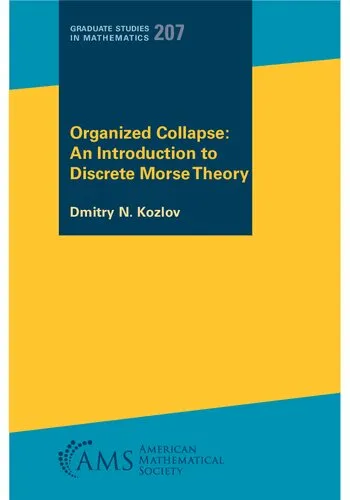Organized Collapse: An Introduction to Discrete Morse Theory (Graduate Studies in Mathematics)
4.3
Reviews from our users

You Can Ask your questions from this book's AI after Login
Each download or ask from book AI costs 2 points. To earn more free points, please visit the Points Guide Page and complete some valuable actions.Introduction to "Organized Collapse: An Introduction to Discrete Morse Theory"
"Organized Collapse: An Introduction to Discrete Morse Theory" is a comprehensive exploration of discrete Morse theory, an essential tool in modern topology and combinatorics. Written for graduate-level readers, this book masterfully bridges the foundational principles of the subject with advanced applications. By guiding readers through a thoughtful narrative sprinkled with examples, exercises, and illustrative explanations, this book becomes an indispensable resource for those embarking on a journey into discrete Morse theory.
The title, "Organized Collapse," is a poetic nod to the core idea of the theory: understanding complex topological spaces through a systematic reorganization of information. The book not only demystifies challenging concepts within discrete Morse theory but provides a platform for their application in higher mathematics, computer science, and beyond. Whether you're a beginning researcher, a mathematics lecturer, or simply an inquisitive learner eager to understand the subject, this book aims to serve as an accessible and authoritative guide.
A Detailed Summary of the Book
The book begins with a gentle introduction to topology and simplicial complexes, ensuring readers have the necessary groundwork for further exploration. Subsequent chapters introduce Morse functions and describe how these functions can simplify the study of topological spaces by reducing them to critical cells. Through precise definitions, elegant proofs, and clear exposition, concepts such as critical points, gradient vectors, and cancelation of cells are made approachable.
Each chapter builds on its predecessor, seamlessly incorporating examples that bring clarity to abstract ideas. From basic definitions, the text transitions to advanced constructions, covering essential topics such as discrete gradient vector fields, homotopy equivalences, and Morse matchings. Readers are introduced to the implications of discrete Morse theory in computational topology, robotics, and data science, demonstrating its versatility.
What sets this book apart is its balanced approach. While rich in rigorous mathematical proofs, the text does not shy away from providing intuitive interpretations that aid in understanding. Additionally, various exercises, ranging from beginner to advanced levels, enable readers to deepen their comprehension and test their skills against real-world problems.
Key Takeaways
- Discrete Morse theory is a powerful method to study the topology of simplicial complexes and manifolds by simplifying their structures.
- The theory provides direct insights into homology calculation, collapsing techniques, and critical-point theory.
- Practical applications of discrete Morse theory include data analysis, computational geometry, and optimization.
- The methodological "collapse" central to the theory is not just a metaphor but a structured way of uncovering essential topological features hidden in complexity.
- Readers will develop a robust understanding of how theory transitions to practical applications, exemplified with concrete scenarios and mathematical results.
Famous Quotes from the Book
"Just as collapsing a structure can reveal its framework, discrete Morse theory uncovers the skeleton of a topological space, one cell at a time."
"Mathematics is often not about building but collapsing what exists, distilling raw structures into their simplest enduring forms."
"A discrete Morse function is like a roadmap through chaos. It tells us where to pause, where to proceed, and ultimately, where all paths converge."
Why This Book Matters
Discrete Morse theory is an area at the intersection of mathematical beauty and practical utility. While it plays a growing role in fields such as data science, robotics, and computational biology, its underlying principles are often viewed as complex and inaccessible. "Organized Collapse" addresses this challenge by presenting these principles in an engaging and digestible manner.
The book’s pedagogical approach ensures it speaks not only to mathematicians but also to specialists from computer science and other disciplines where discrete topology finds meaningful applications. It offers both a rigorous mathematical framework and contextually relevant examples that highlight the theory's utility.
In essence, "Organized Collapse" is more than a textbook; it is a bridge connecting theory and practice. Whether you seek to understand Morse’s original ideas in a discrete setting or want to apply the concepts to real-world problems, this book equips you with the tools to succeed. Its lucid exposition, careful structuring, and thoughtful exercises guarantee its place as a valuable resource in the library of any scholar or practitioner.
Free Direct Download
Get Free Access to Download this and other Thousands of Books (Join Now)
For read this book you need PDF Reader Software like Foxit Reader


